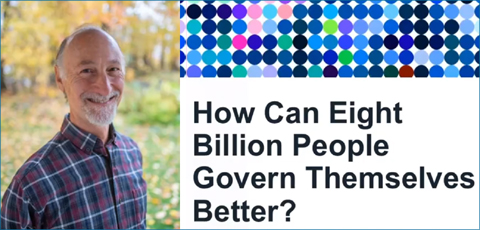 |
 |
|
December 21, 2020 A NEW VIEW ON GOVERNANCE  What brings someone to a spiritual awakening, or religious conviction? One of the wonders of Bahá’u’lláh’s revelation is that many come to believe in it because of its governance. (“I came to the Bahá’í Faith because it has the only organizational structure that can solve our problems!” says one member of the Ottawa Bahá'í community.) “How Can 8 Billion People Govern Themselves Better?” was Maury Miloff’s question, introducing another “Big Ideas” talk to over 175 listeners. Miloff, a long-serving development professional in both governmental and NGO organizations, spent many years abroad promoting good governance. He began, “Governance is fundamentally a spiritual and moral problem.” Policies and technical matters are secondary; they depend upon summoning the necessary resources, and upon finding the collective will to utilize them. What Miloff termed “competitive democracy” has become the most admired form of human administration. However, contemporary democracy still results in societal divisions (racial, religious, economic), polarization, inequality and widespread unhappiness. It rewards aggressiveness. It is profoundly vulnerable to corruption by wealth, “short-term-ism”, and “solutions” expressed as campaign slogans. Despite widespread approval, democracy remains shockingly unstable. But an approach to governance, little known to the public, is steadily growing. In his 40-year mission during the 19th century, Bahá’u’lláh called for a new vision of human life and institutions, and proclaimed its world-shaping power: “Is not the object of every Revelation to effect a transformation in the whole character of mankind, a transformation that shall…affect both its inner life and external conditions?... “The world's equilibrium hath been upset through the vibrating influence of this most great, this new World Order. Mankind's ordered life hath been revolutionized through the agency of this unique, this wondrous System – the like of which mortal eyes have never witnessed…” The working model of this
System – the one Bahá’ís are building – must
be able to answer key questions: “how to bring together people of
different backgrounds” with a “unity of thought and action [that]
elicits wholehearted participation”; how to “break free from the
confines of passivity and…oppression”; how to empower all to serve “the
advancement of civilization”; how to avoid “estrangement towards an
illusory ‘other’”; how to make decisions that “benefit from a diversity
of perspectives…[and] does not…define truth as the compromise between
opposing interesting groups…” |
|
|